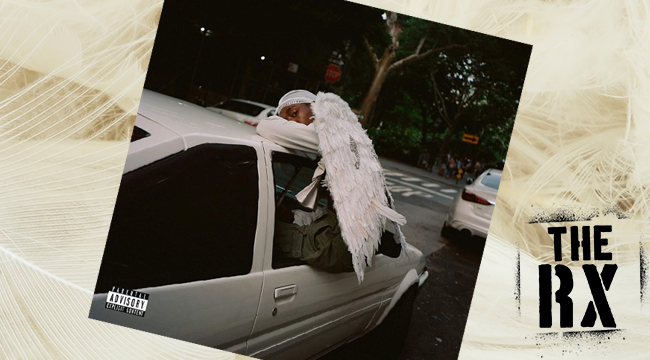
The RX is Uproxx Music’s stamp of approval for the best albums, songs, and music stories throughout the year. Inclusion in this category is the highest distinction we can bestow, and signals the most important music being released throughout the year. The RX is the music you need, right now.
There is a moment on Negro Swan where, despite the undeniably buoyant mid-80s pop-funk, the weight of everything Dev Hynes sings of as Blood Orange on his latest — the way the world categorizes, ostracizes, and alienates marginalized people, the emotional desolation of realizing your own marginalization, the loneliness that threatens to overwhelm in the quiet moments, even amid teeming crowds of humanity — bears down on you, feeling all at once like it’s both crushing you and filling you up. It is very nearly, in the words of album guest and writer Janet Mock. “doing too much,” but not in the sense of being melodramatic for melodrama’s sake. It’s doing its very best to condense and parse such an expansive, knotty experience in musical form that it’s almost overwhelming just in the act of listening.
Yet, at the same time, it’s freeing, it’s evocative, it’s nearly a spiritual experience. It’s being seen, a thing nearly every marginalized person craves and seeks throughout a lifetime. It’s those pockets of understanding, of belonging, of acknowledged humanity, peaking self-worth. The moment for me was late in the second track, “Saint,” a welling up in my chest. That feeling never really went away over the course of the album’s sixteen tracks, not even on interludes like Mock’s “Family” soliloquy, as she ruminates on the purpose of groups and spaces where one can feel free to let their hair down, so to speak. It’s a feeling I know well, but more than that, it’s a feeling I know others know well. It’s heartbreaking to think of walling off parts of yourself for others’ benefits. Hynes understands as well, and Negro Swan is him granting permission, although it should never be needed, to grant yourself grace and the room to be yourself in all your ill-fitting inconvenience. Who cares what the establishment has to say? You belong.
It’s not the first time Hynes has used Blood Orange to wrangle heady, heavy topics, but it may be his most somber. On Freetown Sound, the thrust of his subject matter, what it means to be Black in spaces where it is fraught, frowned up, and oftentimes downright dangerous to be, was softened by the danceability of his synthy, spacey R&B, borrowing as much from the midnight groove of Al B. Sure and Atlantic Starr as from more contemporary sources, anticipating Solange’s declarative A Seat At The Table as a statement of pro-Blackness and self-affirming pride. Here, those influences are muted, slowed-down, sublimated, and stirred, creating a more moody atmosphere, akin to the quiet of an empty apartment after the party has ended and the long cab ride home. Songs like “Chewing Gum” blend in soupy, syrupy, goopy Memphis bounce and Texas screw tape sensibilities, while “Holy Will” takes guest vocalist Ian Isiah — and the listener — all the way to church.
It’s fitting for an album Hynes says is “an exploration into my own and many types of black depression, an honest look at the corners of black existence, and the ongoing anxieties of queer/people of color.” However, that doesn’t mean it’s all melancholic doom-and-gloom. “Hope” is a foil to this overarching theme, the optimistic counter to the weight of the burdens of depression, fear, anger, frustration, and loneliness, complete with a pep talk delivered by one of the greatest motivational speakers of our generation in Sean Combs — credited here in his original Puffy Daddy persona. “Nappy Wonder” speaks to the self-affirming, bold defiance of fear that is the antidote to the sense of dread that has pervaded recent news cycles with near constant references to racist violence and the ever-widening gyre of despair that feels all-encompassing thanks to social media and cable news and increasingly partisan political arenas. This too shall pass.
In an era where music often seeks to escape the depressing effects of our times or directly address the events and politics that are the root of that depression, Negro Swan feels like an antidote crafted to directly address the depression itself. It exists to say, “It’s okay. You’re not alone. You can get through this,” even if it never quite says this directly. The escapism that defined Freetown Sound is far less apparent, but not gone. It’s just diluted and backgrounded in an effort to illuminate the conditions that people need to escape from these days. In that murky condition of anxiety and depression, it’s enough to have something to hold onto, somewhere to go, whether it’s family or just your own internal peace. It’s a unique message, but one it seems we’ve all needed, because, really, we’re not so different after all.
Negro Swan is out now via Domino. Pre-order or pre-save it here.






